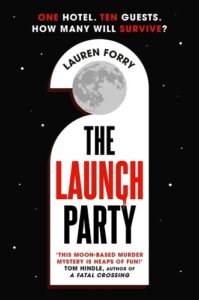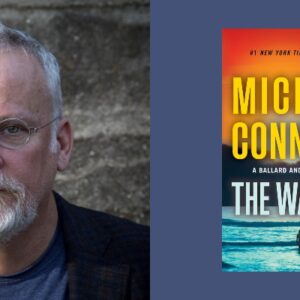A body on the floor. No perceivable way for the murderer to get in or out. Few tangible clues (or so it seems).
Locked room mysteries have long held an appeal to the detective-reader. Our brains demand a rational explanation for the seemingly impossible whodunit and, for those of us who love a puzzle, there is a satisfying thrill that comes with piecing together the clues alongside the detective on the case, and seeing if we can beat them to the solution.
In any locked room mystery, the setting is crucial. It’s right there in the name—locked room—and details about the room are essential to the unraveling of the mystery. From Christie’s Orient Express to the cruise ship in Ruth Ware’s The Woman in Cabin 10, the setting establishes the story’s tone as well as adding another layer to the mystery. Just exactly how did the murderer pull it off? But even in those famous mysteries, the characters have the opportunity to go outside. To getaway. To seek help from an outside source. It may not be easy, but it can be done because there is a viable world outside that locked room, allowing the opportunity for the murderer to escape, or for the protagonist to seek help. Or even for characters to just go outside and get some fresh air. To me, that’s what makes a murder mystery set in space even more enticing. And I don’t mean one set on a distant planet, with a livable atmosphere, but a murder mystery in the dark vacuum of space, in a place where there is no way to sneak away and there are fewer places to hide. Where not only may the still-present murderer come after you, but simply stepping out the wrong door could kill you just as easily.
That was the fun of putting together The Launch Party. Set on the first commercial hotel on the moon, ten strangers are sent on the trip of a lifetime, honored with the privilege of being the first guests at the ultra-exclusive Hotel Artemis. Who wouldn’t fantasize about an exotic, first-class vacation with all-inclusive top tier amenities to the universe’s most exclusive, remote location? The moon’s allure has played on our imaginations throughout the history of human civilization. Almost every recorded culture has invented a mythology involving the moon and, unlike other planets, it is a place humans have actually reached. Because of our fascination and because its within reach, it only makes sense that someone would want to monetize it. Except once you’re at the Hotel Artemis, there’s no way to leave. And the staff is missing. And a billionaire may or may not be trying to kill you. And one person is already dead.
Crafting a murder mystery set in space was some of the most fun I’ve ever had writing. Why?
1) Everyone is a suspect.
Yes, yes—in any mystery, many of the character are designed to be suspects. But when you have a murder in an isolated space— in literally isolated space—it really could be any one of them. They were the only ones there. No one could’ve snuck in. No one could have gotten away. There is no one else. It makes it that much more fun when you have to imagine that every character, even the ones that you love and are rooting for, could be the one that did it. And this makes the characters even more fun to write. And what also makes that fun is…
2) Emotions are even more heightened.
Death is scary. The potential of death in space is high. Whether characters are used to being in space or not, the threat of space is very, very real and not to be taken lightly. So, when someone has already been killed and there’s no way to leave because the environment (or lack thereof) outside will kill you, the situation becomes even more terrifying. This means people have the potential to become even more unhinged. They’ll act irrationally. They’ll say stupid things. Are their increased nerves because they’re the murderer and they’re afraid of getting caught, or are they acting that way just because they’re scared? The story clues given through human behavior become even more fun to parse through. And why shouldn’t everyone be terrified? When you’re trapped in space…
3) Help isn’t coming. (At least not in time.)
The guests at the Hotel Artemis are lucky. It will only take three days for help to arrive on the moon from Earth. Three days while they all wait, trapped with a murderer, and no way out. It’s not like anything else could possibly go wrong in only three, whole days, could it? But it could be worse. What about a murder on an isolated spaceship, where there are no other known lifeforms anywhere nearby? Where distress signals die out in the vacuum of space, unheard and unanswered? Like I said, at least on the moon there is a chance of help arriving. But the knowledge that back up can’t run in at a moment’s notice also makes the story more thrilling. These people—all of them suspects who are already on edge from a murder and from being trapped in space—are trapped with each other, with no idea what could happen next and no one there to save them. Trapped in a spaceship or an outpost or a hotel where a murder has occurred, which means…
4) The entire setting is a crime scene.
Sure, the body will be found somewhere. But whether or not the actual murder occurred in that same place, evidence could be anywhere. Where did the murderer flee to once the crime was committed? Where did they dispose of evidence? What sort of DNA trail did they leave behind? What happened to the murder weapon? There are a finite number of spaces available. And because evidence could be anywhere, anything could be evidence. Is that pen on the floor a clue, or just a pen that got knocked to the floor? Those scratches on a wall—innocuous or invaluable? It can become easy to get caught up in minutia that may not matter, or to overlook a crucial piece of evidence. The potential for red herrings is everywhere. But even if you think you’ve got it figured out…
5) The unexpected can be even more surprising.
Characters have been identified. Spatial parameters have been set. There are only so many options for what could have happened. So, oh, what joy there is when something is revealed that didn’t even seem remotely possible! All the best mysteries have the ability to surprise us (I still revel in the genius that is the resolution to Murder on the Orient Express), but it’s even more fun when a surprise can happen within such restricted parameters. For example, remember, what I said about everyone is a suspect? How there is no one else there? (Or is there?)
So next time you’re in the mood for a locked room mystery, why not venture into the darkest, coldest, most fear-inducing room there is? After all, you know what they say about space and screaming…
***


















